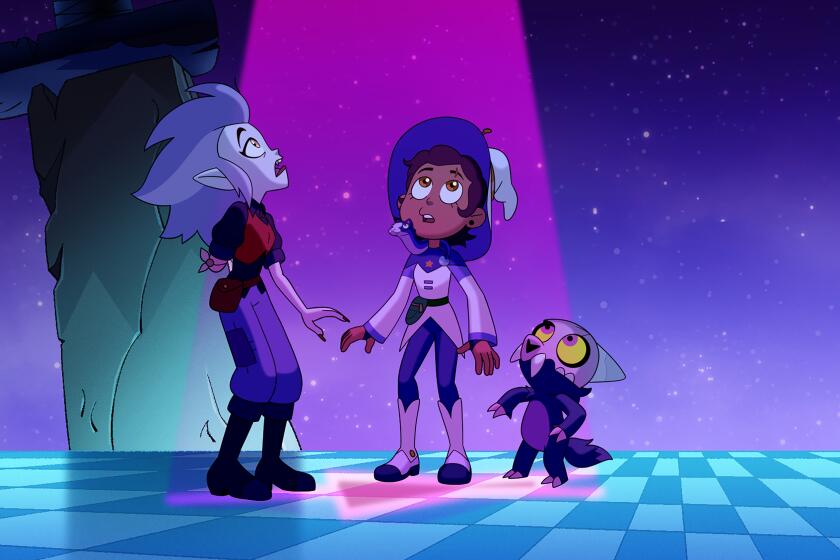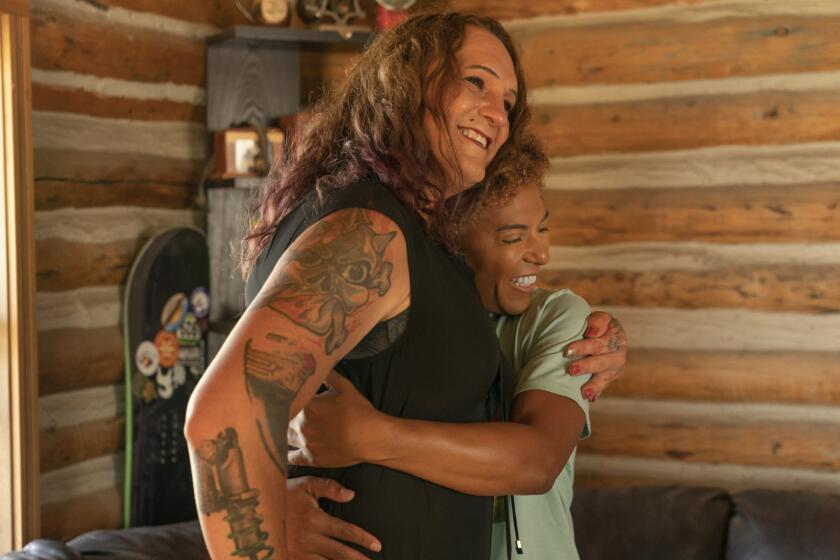As LGBTQ+ rights are challenged, Matthew Shepard’s story is more vital than ever 25 years on

- Share via
It’s been 25 years since Matthew Shepard was discovered brutally beaten and left for dead near a wooden fence outside Laramie, Wyo. He’d been there for 18 hours.
Within days he’d become a household name, as broadcast and print news outlets from across the country (this one included) amplified the story of an out 21-year-old college student who was seemingly attacked just for being gay. And his death on Oct. 12, 1998, would galvanize a movement to demand change.
His story and legacy are revisited in “The Matthew Shepard Story: An American Hate Crime,” a documentary that premiered this week on Investigation Discovery (ID) and is now streaming on Max.
“We wanted to celebrate Matthew’s life,” said Jason Sarlanis, president of Turner Networks, ID and HLN, linear and streaming at Warner Bros. Discovery. “So much of his story has been eclipsed by the violence that was perpetrated on him.”
Sarlanis, who describes the new documentary special as “a true labor of love,” explained during a recent phone call that he immediately took action after he learned that ID, which is dedicated to airing true crime documentaries, had yet to tell Shepard’s story when he joined the team nearly three years ago. “The Matthew Shepard Story” features a mix of voices, including from his friends, media experts and advocates, as well as celebrities who were affected by Shepard’s story.
Inclusive, kid-friendly animated series ‘The Owl House’ is ending at a time when queer and trans people are under attack. Worryingly, it’s not alone.
“This story needs attention as much today as it did a quarter-century ago,” said Sarlanis. “And at the end of this special, what we’re really hoping to do is illuminate how this tragic moment in history really helped propel the entire LGBTQ rights movement forward.”
Indeed, a lot has changed for LGBTQ+ people living in the U.S. since 1998: Marriage equality is recognized, out queer and trans people can serve in the military, the federal anti-hate crime law now includes violence based on sexual orientation and gender identity. Basic rights that were all hard-fought victories.

Shepard’s death became a flashpoint at a time when it seemed like general attitudes about the LGBTQ+ community were trending toward tolerance, but not quite acceptance. Anti-gay prejudice and hostility were still abundant, but more television shows were including (often minor) queer characters or storylines. And these daytime and prime-time acknowledgments that LGBTQ+ people exist in the world meant something to those who needed to see it.
But for every representational gain, there was also plenty of homophobic backlash. Just look at the response to “Ellen,” when both Ellen DeGeneres and the character she played on the popular sitcom came out in 1997 — protests, boycotts and, eventually, cancellation. The ‘90s was the era of policies like “Don’t ask, don’t tell” after all, meaning many were fine with queer people as long as they didn’t have to see or hear about it.
What happened to Matthew Shepard put a full name and face to the very real violence that LGBTQ+ people have to face just for being their authentic selves. His story became national news, with coverage including the grief and outrage of community members, public figures and others around the country.
And as “The Matthew Shepard Story” explains, that was the result of Shepard’s friends and local activists reaching out to national LGBTQ+ rights organizations to make sure his story would be told. What happened to Shepard was so undeniably horrific that advocates and allies — as well as Shepard’s family — would go on to mobilize for specific causes such as hate crime legislation, and more generally around the humanity of LGBTQ+ people, demanding equal protection and equal rights.
I was in high school when Matthew Shepard was killed. What I remember most about the news at the time are images of that wood fence and a snapshot of him, not quite smiling but a seeming embodiment of the nice “boy next door.”
As someone who grew up fairly sheltered, it was the first time I really had to face the reality that people can be killed just for being gay. I remember thinking about just how much force and effort it must take to beat someone to death. As a closeted queer teen, it just made coming to terms with my own identity that much more daunting. Because as naive as I was, I knew that if something like that could happen to someone who looked like Shepard, it could happen to anyone.
Today’s series — ‘Queer Eye,’ ‘RuPaul’s Drag Race’ and ‘We’re Here,’ among others — offer gay and trans communities a place to celebrate who they really are, unlike some competition shows of the past.
We’ve seen more progress in terms of LGBTQ+ acceptance and recognition of rights than I could have imagined back then. Outdated laws that criminalized consensual same-sex intimacy were found to be unconstitutional. “Don’t ask, don’t tell” was repealed. Marriage equality was declared a fundamental right. Hollywood even seemed to be embracing more inclusive storytelling.
But progress isn’t linear. More recently, politicians and activists have been emboldened to be more vocal in their anti-LGBTQ+ rhetoric as they push to strip queer and trans people — including children — of their rights and humanity. States have passed or proposed a record number of anti-LGBTQ+ laws, including those that prohibit trans people from using restrooms that align with their gender, banning gender-affirming care, limiting trans athletes from competing in school sports and even forcing teachers to out trans students.
It’s a reminder that the ignorance, fear and hostility toward queer and trans people has never fully gone away. Shepard was neither the first nor last person to be a victim of anti-LGBTQ+ violence. And not only are members of the LGBTQ+ community, particularly trans women of color, still being killed for who they are, people are now being targeted just for being allies. And it’s the rhetoric that foments violence.
Particularly troubling have been the laws that bar any mention of sexual orientation and gender identity in classrooms. Especially in light of the intensifying movement to ban books, including those that even hint at queer or trans subjects and themes, from schools, libraries and reportedly even book fairs. This means it’s that much harder for kids to learn about queer history at a time when Shepard’s story is more relevant than ever.
Still, a recent GLAAD study has found that an overwhelming majority of people who don’t identify as members of the LGBTQ+ community support equal rights for LGBTQ+ people and believe they shouldn’t be discriminated against. But despite this massive belief that queer and trans people should be able to live their lives freely, a separate joint study with the Anti-Defamation League found that more than 350 incidents of anti-LGBTQ+ harassment, vandalism and assault were perpetrated between June 2022 and April 2023.
Matthew Shepard’s story is a vital reminder for queer and trans people and our allies to stay vigilant. The fight isn’t over until everyone can feel free to live and thrive as who they are. And television, with its reach, is just one front of the cultural battlefield.
More to Read
The complete guide to home viewing
Get Screen Gab for everything about the TV shows and streaming movies everyone’s talking about.
You may occasionally receive promotional content from the Los Angeles Times.









